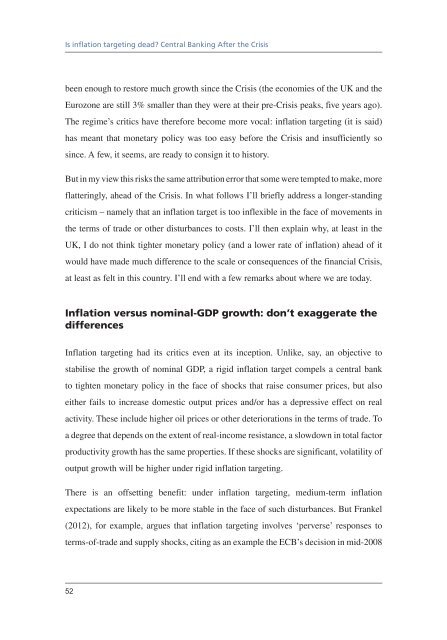Is inflation targeting dead? Central Banking After the Crisis - Vox
Is inflation targeting dead? Central Banking After the Crisis - Vox
Is inflation targeting dead? Central Banking After the Crisis - Vox
Create successful ePaper yourself
Turn your PDF publications into a flip-book with our unique Google optimized e-Paper software.
<strong>Is</strong> <strong>inflation</strong> <strong>targeting</strong> <strong>dead</strong>? <strong>Central</strong> <strong>Banking</strong> <strong>After</strong> <strong>the</strong> <strong>Crisis</strong>been enough to restore much growth since <strong>the</strong> <strong>Crisis</strong> (<strong>the</strong> economies of <strong>the</strong> UK and <strong>the</strong>Eurozone are still 3% smaller than <strong>the</strong>y were at <strong>the</strong>ir pre-<strong>Crisis</strong> peaks, five years ago).The regime’s critics have <strong>the</strong>refore become more vocal: <strong>inflation</strong> <strong>targeting</strong> (it is said)has meant that monetary policy was too easy before <strong>the</strong> <strong>Crisis</strong> and insufficiently sosince. A few, it seems, are ready to consign it to history.But in my view this risks <strong>the</strong> same attribution error that some were tempted to make, moreflatteringly, ahead of <strong>the</strong> <strong>Crisis</strong>. In what follows I’ll briefly address a longer-standingcriticism – namely that an <strong>inflation</strong> target is too inflexible in <strong>the</strong> face of movements in<strong>the</strong> terms of trade or o<strong>the</strong>r disturbances to costs. I’ll <strong>the</strong>n explain why, at least in <strong>the</strong>UK, I do not think tighter monetary policy (and a lower rate of <strong>inflation</strong>) ahead of itwould have made much difference to <strong>the</strong> scale or consequences of <strong>the</strong> financial <strong>Crisis</strong>,at least as felt in this country. I’ll end with a few remarks about where we are today.Inflation versus nominal-GDP growth: don’t exaggerate <strong>the</strong>differencesInflation <strong>targeting</strong> had its critics even at its inception. Unlike, say, an objective tostabilise <strong>the</strong> growth of nominal GDP, a rigid <strong>inflation</strong> target compels a central bankto tighten monetary policy in <strong>the</strong> face of shocks that raise consumer prices, but alsoei<strong>the</strong>r fails to increase domestic output prices and/or has a depressive effect on realactivity. These include higher oil prices or o<strong>the</strong>r deteriorations in <strong>the</strong> terms of trade. Toa degree that depends on <strong>the</strong> extent of real-income resistance, a slowdown in total factorproductivity growth has <strong>the</strong> same properties. If <strong>the</strong>se shocks are significant, volatility ofoutput growth will be higher under rigid <strong>inflation</strong> <strong>targeting</strong>.There is an offsetting benefit: under <strong>inflation</strong> <strong>targeting</strong>, medium-term <strong>inflation</strong>expectations are likely to be more stable in <strong>the</strong> face of such disturbances. But Frankel(2012), for example, argues that <strong>inflation</strong> <strong>targeting</strong> involves ‘perverse’ responses toterms-of-trade and supply shocks, citing as an example <strong>the</strong> ECB’s decision in mid-200852














